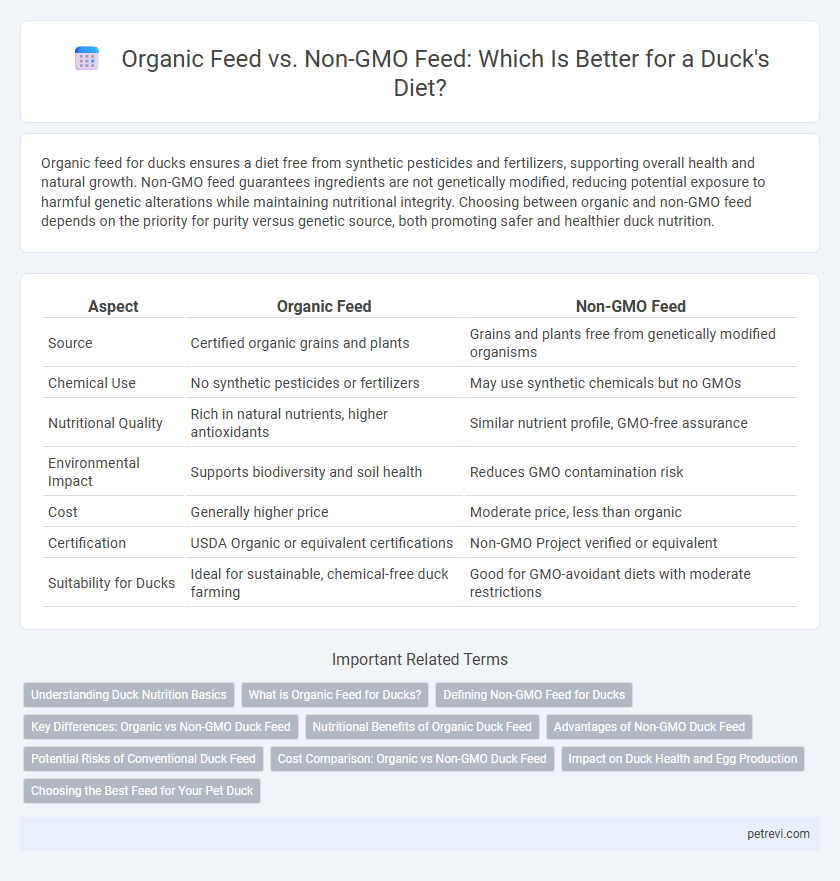Organic feed for ducks ensures a diet free from synthetic pesticides and fertilizers, supporting overall health and natural growth. Non-GMO feed guarantees ingredients are not genetically modified, reducing potential exposure to harmful genetic alterations while maintaining nutritional integrity. Choosing between organic and non-GMO feed depends on the priority for purity versus genetic source, both promoting safer and healthier duck nutrition.
Table of Comparison
| Aspect | Organic Feed | Non-GMO Feed |
|---|---|---|
| Source | Certified organic grains and plants | Grains and plants free from genetically modified organisms |
| Chemical Use | No synthetic pesticides or fertilizers | May use synthetic chemicals but no GMOs |
| Nutritional Quality | Rich in natural nutrients, higher antioxidants | Similar nutrient profile, GMO-free assurance |
| Environmental Impact | Supports biodiversity and soil health | Reduces GMO contamination risk |
| Cost | Generally higher price | Moderate price, less than organic |
| Certification | USDA Organic or equivalent certifications | Non-GMO Project verified or equivalent |
| Suitability for Ducks | Ideal for sustainable, chemical-free duck farming | Good for GMO-avoidant diets with moderate restrictions |
Understanding Duck Nutrition Basics
Organic feed for ducks ensures meals free from synthetic pesticides and fertilizers, promoting natural growth and enhancing immune health. Non-GMO feed eliminates genetically modified ingredients, reducing potential allergenic risks while maintaining balanced protein and nutrient content essential for duck development. Understanding these differences helps optimize duck nutrition, supporting better digestion, feather quality, and overall vitality.
What is Organic Feed for Ducks?
Organic feed for ducks consists of grains, seeds, and plant materials grown without synthetic pesticides, herbicides, or chemical fertilizers, ensuring a natural and chemical-free diet. This feed supports the health and growth of ducks by providing nutrition free from genetically modified organisms (GMOs) and artificial additives. Choosing organic feed promotes sustainable farming practices and enhances the overall quality of duck products like eggs and meat.
Defining Non-GMO Feed for Ducks
Non-GMO feed for ducks consists of ingredients derived from crops that have not been genetically modified, ensuring the absence of transgenic DNA or proteins. This type of feed is formulated to provide natural nutrition while avoiding genetically engineered components often found in conventional feed. Emphasizing non-GMO feed helps maintain the ducks' natural diet and supports organic farming practices aimed at reducing synthetic inputs in poultry nutrition.
Key Differences: Organic vs Non-GMO Duck Feed
Organic duck feed is produced without synthetic pesticides, fertilizers, or genetically modified organisms, ensuring a natural and eco-friendly diet that promotes better animal welfare and environmental sustainability. Non-GMO duck feed guarantees the exclusion of genetically modified ingredients but may still include conventional pesticides and synthetic additives, offering a middle ground between conventional and fully organic options. Key differences revolve around certification standards, ingredient sourcing, and the presence of synthetic chemicals, with organic feeds typically adhering to stricter regulations and higher costs.
Nutritional Benefits of Organic Duck Feed
Organic duck feed offers superior nutritional benefits by providing ducks with higher levels of essential vitamins, minerals, and antioxidants compared to non-GMO feed. The absence of synthetic pesticides and fertilizers in organic feed ensures cleaner, toxin-free nutrition that supports better immune function and overall health. Studies indicate that organic feed enhances growth rates and improves the quality of duck meat and eggs through richer nutrient profiles.
Advantages of Non-GMO Duck Feed
Non-GMO duck feed enhances bird health by reducing exposure to genetically modified organisms, which can lead to improved digestion and nutrient absorption. It supports natural immune system development, resulting in lower susceptibility to common duck diseases and better overall growth performance. Farmers benefit from higher quality meat and eggs that meet consumer demand for clean, traceable, and non-GMO products.
Potential Risks of Conventional Duck Feed
Conventional duck feed often contains pesticides, synthetic fertilizers, and genetically modified organisms (GMOs) that may pose health risks such as compromised immune function and increased susceptibility to disease. Exposure to antibiotic residues and chemical additives in non-organic feed can lead to antibiotic resistance and toxin accumulation in ducks. Choosing organic or non-GMO feed reduces the potential for these harmful contaminants, promoting better overall health and sustainable farming practices.
Cost Comparison: Organic vs Non-GMO Duck Feed
Organic duck feed typically costs 20-30% more than non-GMO feed due to certification expenses and stricter farming practices. Non-GMO feed offers a more affordable option while still avoiding genetically modified ingredients, making it appealing for budget-conscious duck farmers. Cost differences impact long-term feeding strategies, with organic feed favored for premium quality, whereas non-GMO feed provides balance between cost and health benefits.
Impact on Duck Health and Egg Production
Organic feed for ducks, rich in natural nutrients and free from synthetic pesticides, significantly enhances duck health by boosting immunity and reducing exposure to harmful chemicals. Non-GMO feed, while avoiding genetically modified ingredients, may lack the comprehensive benefits of organic certification, potentially influencing gut health and nutrient absorption differently. Studies show ducks fed organic diets often exhibit improved egg production rates and quality, attributed to higher nutrient bioavailability and lower toxin levels compared to non-GMO but conventionally grown feed options.
Choosing the Best Feed for Your Pet Duck
Choosing the best feed for your pet duck involves evaluating the benefits of organic feed versus non-GMO feed, with organic options often providing pesticide-free nutrition and enhanced nutrient profiles that support overall duck health. Non-GMO feed ensures the exclusion of genetically modified ingredients, which some owners prefer for natural growth and reduced exposure to artificial chemicals. Prioritizing a balanced diet rich in vitamins, minerals, and safe protein sources is crucial to promote optimal digestion, feather quality, and immune function in pet ducks.
Organic Feed vs Non-GMO Feed for Duck Diet Infographic

 petrevi.com
petrevi.com